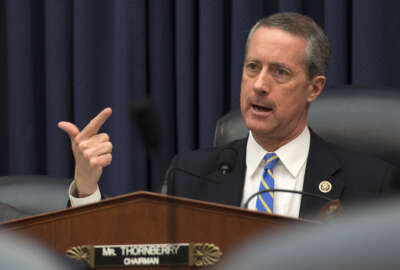 Exclusive
Exclusive Congress looks to Trump for funds left behind in NDAA
The House Armed Services Committee Chairman is hoping President-elect Donald Trump will introduce a supplemental defense budget when he gets in office.
Congress is already looking for a way to cash in on President-elect Donald Trump’s promise to increase military funding.
Less than a day after the House and Senate came to a compromise on the 2017 defense authorization bill, House Armed Services Committee Chairman Mac Thornberry (R-Texas) is looking to Trump to recoup his losses during the negotiations.
“My hope is that the new administration will come to us with a supplemental request as soon as they get their feet on the ground. It was disappointing that in order to get this bill done now and to stop the end strength hemorrhaging that we were not able to have as much funding as the House had originally had,” Thornberry said Nov. 30 during an event hosted by the Foreign Policy Initiative in Washington.
The final bill authorized an additional $3.2 billion to the President’s budget request. That money went to increasing force strength in the services and increasing the military pay raise from 1.6 percent to 2.1 percent.
But the House bill originally had $18 billion more than the President requested. Those are the funds Thornberry is hoping Trump will replenish with a supplemental fund.
The House bill paid for everything in the final NDAA plus some big weapons procurement items. It would have supported 10 carrier wings, instead of the nine the President requested. It would have procured 15 F-18s instead of two, 72 Blackhawk helicopters instead of 36 and 74 F-35s instead of 63.
The bill called for other aircraft procurements and an increased Navy, which increased battleships by three and Virginia Class Submarines by one.
The bill also increased funding for the Missile Defense Agency and the National Nuclear Security Agency.
Congress was forced to back down from its procurement spending spree because of a fundamental disagreement with the Obama administration.
The White House is focused more on capability, while Congress — mainly Republicans — fall in the capacity camp.
“We have this debate with the Obama administration all the time. You can have a more capable ship, but it can still only be in one place at one time. You have to have numbers to cover geography and these days when you have such a huge array of threats. … There is no substitute for numbers,” Thornberry said.
The Obama administration is more interested in heading off the threats of tomorrow.
“It’s a difference in priority and your view of where the competition is headed in the future,” said Todd Harrison, a senior fellow at the Center for Strategic and International Studies. “Capacity helps you more today, it helps you with the kind of challenges and threats that we are facing today, and the real demand on the Navy right now is to be in more places than they can cover.”
DoD thinks threats are growing and getting more complex and the country’s weapons need to be ahead of those threats in the future, Harrison said.
In fact, Defense Secretary Ash Carter scolded Navy Secretary Ray Mabus late last year in a letter when Mabus did not reduce the planned number of Littoral Combat ships for the 2017 budget.
Mabus later acquiesced.
To avoid a veto, Thornberry and his colleagues had to tone down their thirst for capacity. Not to mention the fact that the House bill used unconventional budget tactics and significantly increased the defense budget without raising the domestic budget — two other sticking points for the White House.
Thornberry said he is fairly confident President Barack Obama will sign the bill.
“I do not believe that the President will veto the bill. This is the first time in several years that the troops will receive the full pay raise in which they are statutorily entitled. That alone, I think, makes it difficult to veto,” Thornberry said. “You never know what his calculation will be. On the other hand, many of the provisions to which they had objections have been altered or changed.”
But Thornberry said he feels more akin to Trump’s stance on the military.
Trump’s “focus on rebuilding the military is exactly right,” Thornberry said.
Trump said previously that he wants to boost military spending.
Copyright © 2025 Federal News Network. All rights reserved. This website is not intended for users located within the European Economic Area.
Scott Maucione is a defense reporter for Federal News Network and reports on human capital, workforce and the Defense Department at-large.
Follow @smaucioneWFED





